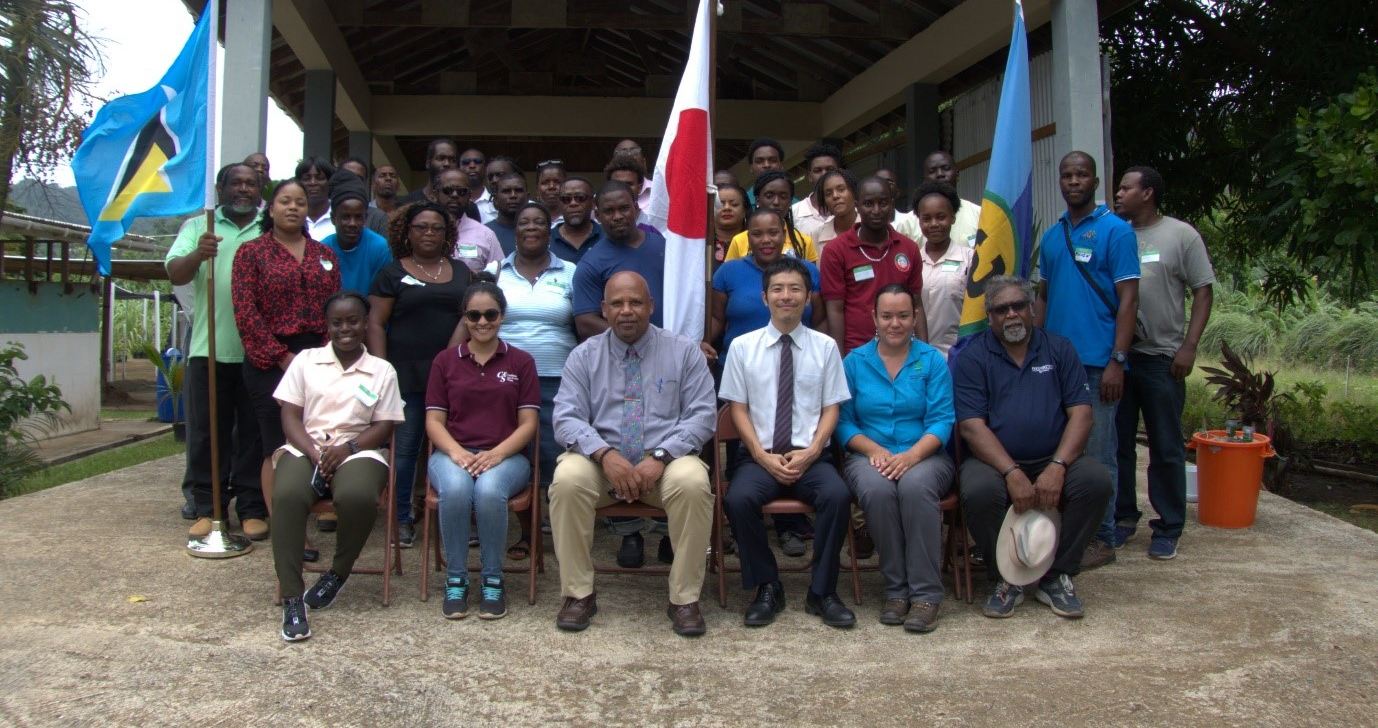Climate Smart Agriculture: Farmers and Stakeholders trained in ICTs
CARDI Press Release
Farmers, students, and agriculture stakeholders from seven OECS Member States were recently trained in Crop Scheduling and Water Use Efficiency for Climate Change by the Caribbean Agricultural Research and Development Institute (CARDI), Saint Lucia.
The two-day workshop, held in Saint Lucia from September 24-25, utilised Information and Communication Technologies (ICTs) to analyse market trends, schedule production, map farm locations and integrate automated and injector irrigation systems into farm practice.
The training was part of the Advancing ICTs for Climate Smart Agriculture (CSA) project funded by the Japan-CARICOM Overseas Friendship and supported by the Ministry of Agriculture, Fisheries, Physical Planning, Natural Resources and Cooperatives, Saint Lucia.
Over 30 individuals participated in the event from from Antigua and Barbuda, the Commonwealth of Dominica, Grenada, Montserrat, St Kitts and Nevis, Saint Lucia and St. Vincent and the Grenadines.

Honourable Ezechiel Joseph, Minister of Agriculture in Saint Lucia; and Mr Toshihide Kanaya, Second Secretary at the Embassy of Japan in Trinidad, visited the first day of the workshop.
Minister Joseph on visiting the workshop expressed,
“I am happy to see so many young farmers here today. We have to embrace the technology and begin to make the necessary changes if we are going to reduce our food import bill.”
“We also need a regional approach in creating and implementing policies, so I am pleased to have our OECS Member States represented here today. There is need for serious research in adopting these kinds of technologies that consider the challenges of climate change.”

Climate variability and change continues to impact the Caribbean region and affect food production systems. Changes in temperature and rainfall directly affect crop yield and animal production and can create an unstable market. In Saint Lucia, cultural festivals like Creole, Jazz, Carnival and Christmas also affect the demand and supply of the market. Farmers, therefore, need to implement practices that allow for an effective and consistent supply of produce to meet the market demands. Coupled with increases in production and productivity, this will contribute towards reducing the food import bill of Saint Lucia.
CARDI supports the Government and the Ministry of Agriculture in Saint Lucia in working towards a reduced import bill for cabbage, lettuce, tomato, bell peppers, cantaloupe, watermelon and pineapple under the Import Substitution Programme.
ICTs examined in the workshop included a web-based crop scheduling application and an automated irrigation application, both of which can be used on mobile phones.
Fertigation and injector irrigation systems were also examined along with the use of sub-surface irrigation and soil moisture probes to effectively manage water. The mobile application ‘Terra Sync’ was used on over 100 farms to map locations and these maps allowed for recognition of soil types, landslide and flood zones. Information was also shared on how to prepare for such potential hazards in these zones and potentially reduce the impact.
Farmer Garvey Charlemagne said,
“I would definitely endorse the use of ICTs on farms around the island, especially in an effort to mitigate the effects of climate change. We need to embrace the use of technology in agriculture. This results in major cost savings for the farmer, as it is less labour intensive, ensures that water is used effectively for irrigation and addresses the high cost of weed management."
“The technology which we were exposed to in this project will undoubtedly enhance the agricultural sector, not only here in Saint Lucia but for our Caribbean colleagues as well."
“I have embraced the use of ICT as a tool for marketing and networking with other farmers and I am presently working towards implementing other aspects that I was exposed to - such as fertigation, automated watering, the use of tools to measure soil water levels, the application of sub-surface drip tapes and the use of mulching to eliminate the need for constant weeding."

The workshop was held at the CARDI Field Station and the Bethel Blessings Events and Conference Centre in Dennery, Saint Lucia, and was facilitated by Dr. Govind Seepersad, Dr. Dave Goorahoo and Ms. Shivani Seepersad. The project is managed by Ms. Andrea K. Veira at CARDI, Saint Lucia.
About the Caribbean Agricultural Research and Development Institute (CARDI):
CARDI was established in 1974 to serve the agricultural research and development needs of the Member States of the Caribbean Community (CARICOM). CARDI is positioned to contribute to the sustainable development of the Caribbean by the co-generation, diffusion and application of knowledge, through agricultural research for development. The Institute’s Headquarters is located at the University Campus, St. Augustine, Trinidad and Tobago.
About the Japan-CARICOM Friendship and Cooperation Fund (JCFCF):
The Friendship and Cooperation Fund has facilitated funding from the Japanese government to Caribbean Community Member States in a variety of areas including small and medium-sised enterprises, culture, agriculture, information technology, environment protection and participation in various trade fairs; and funding from the Japanese private sector in the areas of energy, the environment and tourism.
Andrea K. Veira
OECS Communications Unit
